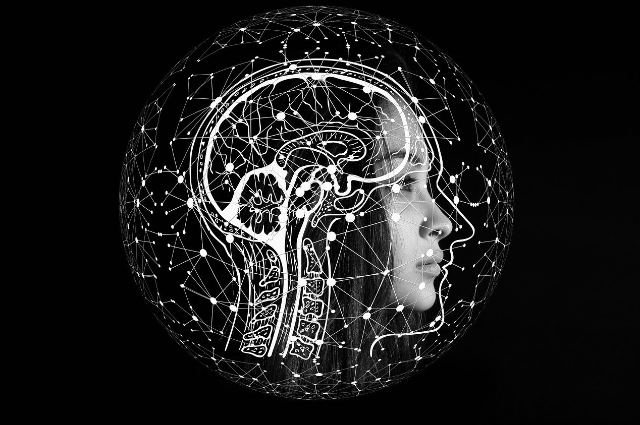
I often feel like my brain is on a different frequency than the world. Bipolar, EUPD, OCPD - labels that are supposed to explain me - barely scratch the surface. Honestly, society doesn’t know what to do with minds that don’t follow the standard blueprint. You grow up being told to sit still, to focus, to obey rules. My brain doesn’t obey. It jumps, it spirals, it obsesses, it withdraws. And the world calls it difficult, emotional, broken.
School was the first place I noticed it. I could memorize, excel, write, recite - but only if my brain decided to cooperate. If it didn’t, I burned out, I cried, I self-harmed. Teachers didn’t understand. Parents were confused. I wasn’t “bad,” I just wasn’t conventional. My energy wasn’t linear, my attention wasn’t predictable. And that mattered — more than it should.
Society is built for the neurotypical. Offices, schools, public spaces, social expectations — all made for people who can keep steady hours, hold attention for long periods, and manage emotions neatly. Neurodivergent people don’t fit that mold. We hyperfocus on one thing and neglect another. We get exhausted in crowds. We need space to decompress. We think differently. And instead of making room for that difference, the world often punishes it.
Then there’s the privilege angle. Therapy, medication, accommodations, flexible schedules - they cost money. I am lucky. I have a therapist I see regularly, medication that keeps me alive, and a life that allows me to take breaks when I need them. But many people aren’t that lucky. Families with less money or awareness often see neurodivergence as laziness, naughtiness, or even moral failing. A child who can’t sit still, a student who can’t focus, an adult who can’t maintain strict schedules - society calls them “difficult” rather than seeing that their brain works differently.
Even with privilege, judgment is everywhere. I work in bursts. Sometimes I cancel plans because I’m depleted. I need routines that suit my brain. People call me inconsistent. I internalize it. I question myself. Sometimes I think maybe I should just conform, just pretend. But pretending is painful. It drains me. It makes me feel less alive. And yet, the pressure to conform never stops.
Workplaces are brutal. They expect uniformity. Nine-to-five, deadlines, hierarchical decision-making — none of it is designed for someone whose attention, memory, or emotional energy fluctuates. When I’m hyperfocused, I can outperform anyone. When I need rest or accommodation, I face scrutiny. The system rewards consistency, but neurodivergent brains are full of variation. Always. And education is no better. Standardized exams, rigid curricula, timed assignments — all made for linear brains. Creativity, intensity, and unconventional problem-solving often go unrecognized. Brilliant students flounder because the system doesn’t see brilliance beyond conformity.
Being neurodivergent also affects identity. I am not just my diagnoses. I write, I love, I create, I survive. But acknowledging my neurodivergence has been vital. It’s not an excuse, it’s not a badge, it’s a way to understand myself and the way I navigate the world. Recognition is powerful. It allows me to ask for help, to adjust expectations, to survive without constantly punishing myself for being different.
Social relationships can be equally tricky. Emotional regulation, impulsivity, and sensitivity often become a double-edged sword. People celebrate the creative side, the intensity, the empathy — until it disrupts their expectations. Then suddenly, we are “too much.” Friendship, love, and collaboration — all need extra effort. You can’t just exist and be neurodivergent; you must constantly negotiate, explain, and sometimes apologize for being wired differently. That negotiation is exhausting, invisible labor that neurotypical people rarely notice.
Society is slowly changing. People are talking about neurodiversity. Some workplaces and schools are starting to offer flexible hours, accommodations, and support. The media portrays neurodivergence more sympathetically, even if imperfectly. But awareness is not access. And access is often gated by money, class, and social privilege. That tension — between recognition and real opportunity — is where society still fails us.
Policies help, but they are limited. Governments in some countries mandate disability accommodations, flexible working, and inclusive education, but implementation is inconsistent. In India, the Rights of Persons with Disabilities Act recognizes some neurodivergent conditions, but social stigma, lack of trained professionals, and financial barriers limit the impact. Schools rarely adapt curricula, and workplaces rarely adjust schedules. Without societal empathy, policies remain pieces of paper.
For me, coping is therapy, medication, writing, and designing routines that suit my brain. That’s my survival strategy. Not everyone can do that. And I can’t stop thinking about how much talent, creativity, and potential slip away because the world refuses to bend a little to accept difference without judgment. How many minds are exhausted or silenced simply because they don’t fit the mold?
Neurodivergence is not weakness. It is not laziness. It is a mode of being that requires understanding, compassion, and structural support. Until society recognizes that, neurodivergent people will continue navigating invisible obstacles — celebrated when they conform, criticized when they don’t, struggling to survive in systems never built for them.
I am neurodivergent. I am alive. And that, I think, is enough. It is radical. It is defiant. It is beautiful. And if society can learn to make space for brains like mine, maybe more people won’t just survive — maybe they will thrive.
. . .
References / Further Reading:
- National Institute of Mental Health (NIMH) – Neurodiversity
- American Psychological Association – Neurodivergence in Education
- Forbes – The Business Case for Neurodiversity
- The Conversation – Neurodiversity and Society
- BBC Future – Living With Neurodivergence
- Mind UK – Understanding Neurodiversity
